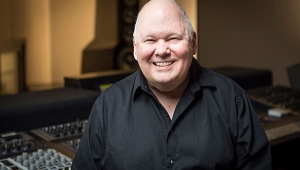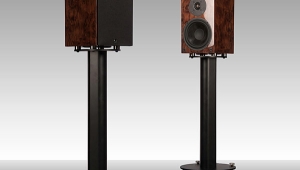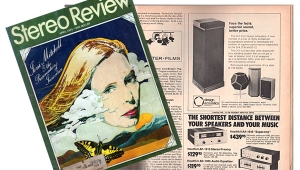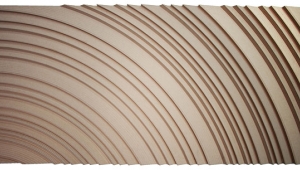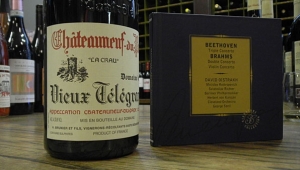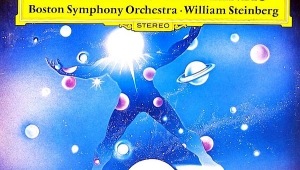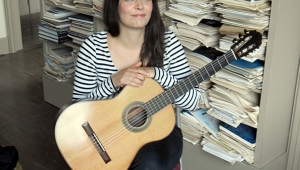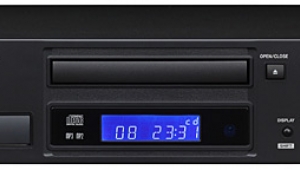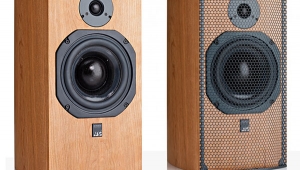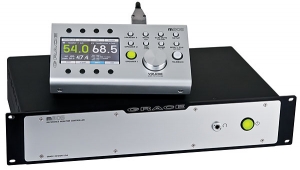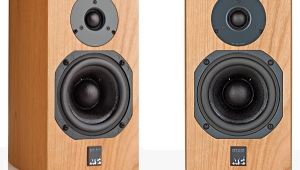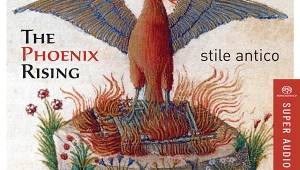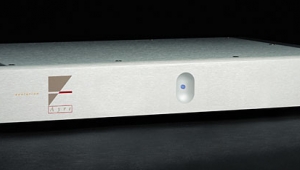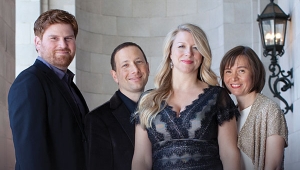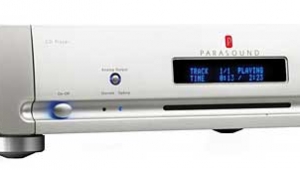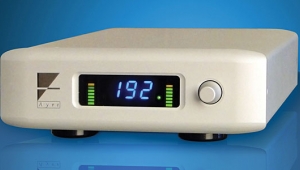| Columns Retired Columns & Blogs |
The Fifth Element #61 Page 3
Other orchestral recordings that still arrest my memory are Erich Leinsdorf and the BSO's phenomenal reading of Holst's The Planets (Deutsche Grammophon), von Karajan's Scheherazade for its solos by concertmaster Michel Schwalbé (DG, although Charles Dutoit and the Montreal Symphony's effort for Decca is also wonderful), Antal Dorati's of Dvorák's Symphony 9 (London Phase 4), Stokowski's unique, non-Ravel orchestration of Mussorgsky's Pictures at an Exhibition (London Phase 4), Rafael Kubelik's engaging disc of Dvorák tone poems including The Golden Spinning Wheel (DG), Sir Adrian Boult's magisterial recording of Elgar's Symphony 2 (EMI), and, for sheer exuberance, Malcolm Arnold conducting his own symphonic dances (Lyrita).
Footnote 2: John Atkinson is also a Karen Carpenter fan—see his August 1998 "As We See It."—Ed.
The violin and its stablemates, of course, have been a longtime fixation. Susanne Lautenbacher's Vox Box of J.S. Bach's violin concertos, including the Double Concerto, was a fixture in my life for many years. David Oistrakh's recording of Bruch's Scottish Fantasy (Decca) showed me that this music was not just empty fireworks, while Oistrakh's disc of Brahms' Violin Concerto, with George Szell and the Cleveland Orchestra (Angel), still exemplifies for me the best in large-scale violin playing, with Menuhin's mono recording with Furtwängler second (EMI). Michael Rabin's recording of Wieniawski's Concerto 2 (EMI) for me represents the outer limit of heart-on-sleeve violin playing that still is (mostly) about the piece, not the player.
I was never a huge Jascha Heifetz fan, but one would have to have the ears of the Velveteen Rabbit not to fall under the spell of his "Vitali" Chaconne, an RCA recording that suffers not much at all from being in mono, but somewhat from having the organ sound as if it were in another room, with the connecting door closed. Joseph Szigeti's Vanguard LPs of the Bach Sonatas and Partitas still set a standard for me for musicianship.
For years, I would buy every new recording of the string quartets of Ravel and Debussy that came out. The Nuovo Quartetto's (Denon Japan), sadly no longer available, is still my favorite, but the Melos Quartet's effort is very fine (DG), and the Quatuor EbËne's recent release (Virgin Classics) deserves the "Records To Die For" listing I gave it. Messiaen's Quartet for the End of Time has long been a favorite, especially the version with clarinetist Gervase de Peyer (EMI), recorded under the composer's supervision.
I am very picky about pianists, and probably have the shortest short list of anyone: Moravec, Michelangeli, Rubinstein. Moravec's Connoisseur Society recording of Franck's Prelude, Chorale, and Fugue remains flabbergasting nearly 40 years on. The late piano music of Brahms remains very important to me. For me, his Intermezzo in A Major, Op.118 No.2, exemplifies Brahms at his most autumnal and elegiac; if I could take only one piece of piano music to that desert island, that would be it, and Moravec owns the piece. Schumann's was the first piano concerto I fell in love with, and Lili Kraus's interpretation with the Vienna State Opera Orchestra on Vanguard Everyman was the one I first fell in love with.
I have always been a sucker for crossover music. The one folk-classical crossover effort that I think still is worth hearing—at least once—is Phil Ochs's chamber-symphony-ish "Pleasures of the Harbor." Procol Harum's lumbering live classical-crossover album with the Edmonton Symphony gave the group its final US radio hit, "Conquistador." I can still listen to it, but I'm not as taken (or as taken in) as I was when it first came out. I was a big fan of Procol Harum, and, to a lesser extent, of King Crimson. I was even a Grateful Dead fan, and attended a few live concerts.
The blues-rock and jazz-rock crossovers I fell for when they were new—the first two albums each from Blood, Sweat & Tears and Chicago (all on Columbia)—perhaps have not held up as well, but there are worthwhile moments to be had. I was a big fan of Hubert Laws' crossovers, especially The Rite of Spring (CTI). Jim Hall's Concierto (CTI) I don't really consider a crossover—it needs no defending. And seeing as it documents the last time Chet Baker and Paul Desmond played together, you really should own it. Al Jarreau's live Look to the Rainbow contains some of his best work. The same goes for Van Morrison's Too Late to Stop Now (both on Warner Bros.). I confess to having at one time owned LPs by Patrice Rushen and by Perry Botkin, Jr., but you don't need to unless you're pursuing a combined degree in music and sociology.
Speaking of falling, I had a major crush on Karen Carpenter from the first time I saw her bashing her drums on the Virginia Graham TV show. I played the 45rpm single of "Close to You" back to back countless times. There's an early music video of "Close to You" on YouTube. There was something in the quality of her voice (footnote 2). What a pity she dieted herself to death.
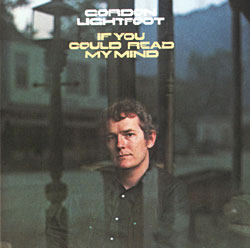 A happier fate was in store for my other 1970s female-vocalist major crush, Linda Ronstadt. I also really enjoyed Anne Murray's middle-period LPs. Between my purchases of everything new put out by Gordon Lightfoot, Joni Mitchell, and Murray, I felt I deserved some recognition from the government of Canada. Ella Fitzgerald's The Cole Porter Songbook was a revelation to me, as was a Jane Olivor live concert I attended, not knowing what to expect. The last female vocalist on whom I had a crush was Kiri te Kanawa.
A happier fate was in store for my other 1970s female-vocalist major crush, Linda Ronstadt. I also really enjoyed Anne Murray's middle-period LPs. Between my purchases of everything new put out by Gordon Lightfoot, Joni Mitchell, and Murray, I felt I deserved some recognition from the government of Canada. Ella Fitzgerald's The Cole Porter Songbook was a revelation to me, as was a Jane Olivor live concert I attended, not knowing what to expect. The last female vocalist on whom I had a crush was Kiri te Kanawa.
A New Write-In Competition!
The last two having been signal successes, JA agrees it is time for another! Yay!
The premise is simple: What are the five tracks or albums that, for you, most strongly strike the mystic chords of memory?
Remember: This competition is about the music that, even if you hardly ever listen to it any more, most strongly evokes places and times in your past; music with which you have a transrational emotional connection—not which are the greatest tracks or albums you know, not the tracks or albums you think other people should know, and not a list of your Desert Island records. Instead, please let us know which tracks or albums are most firmly lodged in your subconscious. What are the sounds or songs that involuntarily trigger your strongest associations? Think Marcel Proust and his little French cookies. Or rather, don't think: feel.
The rules:
1) Entries must be received by August 31, 2010, at this address, with the subject line "Mystic Chords."
2) The list must consist of five commercially released tracks or albums that have for you the greatest power to trigger memories. No alternate picks or honorable mentions, please.
3) Explanations are not required, and will be permitted only if they are as brief as possible. Entries that go much beyond 25 words of justification per pick risk being disqualified.
4) Judging will be subjective, but mostly on the basis of the creativity, originality, and overall impact of the lists.
5) Unless John Atkinson lends a hand, judging will be by John Marks.
6) The 12 winners will each receive a single CD of their choice from the Stereophile online store.
You can see my picks in the sidebar. Okay—get your entries in!
Footnote 2: John Atkinson is also a Karen Carpenter fan—see his August 1998 "As We See It."—Ed.
- Log in or register to post comments
